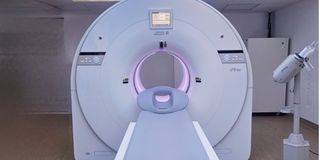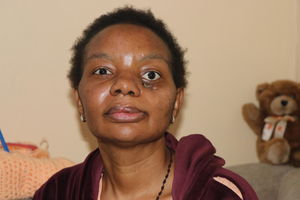Cancer patients in crisis as PET scan drug shortage bites nationwide

Positron emission tomography scan machine.
Cancer patients across Kenya have been left stranded for over a month, as a crippling shortage of a crucial radiotracer has brought vital diagnostic scans to a halt, delaying detection, treatment, and monitoring of the disease.
The delay creates a dangerous window for cancer cells to multiply unchecked, potentially worsening diagnosis and delaying timely treatment.
Ms Grace Nduta, a stage-four cancer patient, has battled an irritating cough.
The moment her doctor heard it, he immediately recommended a Positron Emission Tomography-Computed Tomography (PET-CT) scan to assess whether her treatment needed adjustment.
But when she tried to book the scan, she was met with an unexpected obstacle.
“There are no materials to make the medicine needed for the scan,” she was told at Kenyatta University Teaching, Referral and Research Hospital (KUTRRH), one of the few facilities in Kenya offering the service.
A PET scan involves injecting a small, safe amount of radioactive material (a radiotracer) into the body to highlight areas of abnormal cell activity.
The test is crucial for cancer detection, staging, and treatment monitoring.
Dr Solomon Mutua, a clinical oncologist at Nairobi West Hospital, warns that these delays could have dire consequences.
"For many cancer patients, timely diagnosis and monitoring are everything. A delay of even a few weeks can allow the disease to advance significantly," he explains.
“You can use it for staging the disease—which means knowing the extent of the cancer. Is it localised? Has it spread? Is it locally advanced? If the cancer was very active before treatment, you can assess it in between or after treatment to see if it’s less active or not active at all,” he added.
“Apart from assessing treatment response, it also helps us with radiotherapy planning. We can use the PET scan to make radiotherapy planning more accurate, and finally, it can be used for surveillance,” he said.
Nduta's experience is not unique.
Across the country, cancer patients are being turned away due to a nationwide shortage of radioisotopes—key components in the radiotracers (also known as radiopharmaceuticals) required for PET-CT scans.
On Tuesday, Ruai Family Hospital—another facility that offers the service and where she had left her details in hope—sent her a text confirming the delay, attributing it to the nationwide radioisotope shortage.
“RFH specialist hospital Cancer centre Nairobi regrets delays in your PET scan due to nationwide Radioisotopes shortage. Service may resume between Thursday/Friday this week and next week. Please await an official communication with your rescheduled date/time. We apologise for the inconvenience and appreciate your patience,” the hospital said in the message seen by Nation.
For cancer patients like Nduta, the wait is agonising.
“The cancer is not waiting, yet I am stuck. It is sad and scary at the same time that I don’t know what is happening to me, and I am still coughing. I pay Sh55,000 through the Social Health Insurance Fund (SHIF) for this scan. I sought the service from a private hospital and was quoted Sh150,000—money I can’t afford,” she said, adding that she has exhausted her Social Health Authority (SHA) cover and can no longer access subsidised treatment.
As the crisis persists, patients like Nduta are left with no choice but to wait, hoping their condition does not deteriorate further while the country scrambles to resolve the shortage.
With cancer now the third leading cause of death in Kenya—after infectious and cardiovascular diseases—the demand for PET scans is high.
Data from the Ministry of Health shows that cancer cases have risen to 42,116 annually, with 15,566 male and 26,550 female new cases.
Besides cancer, PET scans also help diagnose and monitor brain disorders such as Alzheimer’s disease, Parkinson’s disease, and epilepsy.
In interviews, dozens of cancer patients or their relatives told Nation they were asked to check back later, with no tentative dates given.
However, access remains limited.
Only a handful of facilities in Kenya offer PET-CT scans, all located in Nairobi, forcing patients from other regions to travel long distances.
Dr Samuel Kubania, a nuclear medicine technologist at Nairobi West Hospital, said the facility relies on KUTRRH to supply radiopharmaceuticals.
“In terms of accessibility, it's very limited because demand is high. Based on what we see daily, the need for scans is increasing as cancer cases rise,” said Dr Kubania.
“If KUTRRH doesn’t have it, then all institutions depending on them are also down,” he explained.
The issue, he said, stems from a lack of key components used to make the radiopharmaceutical. One of the main reagents, Fluorine-18, is produced using a machine called a cyclotron.
“Aga Khan Hospital has a cyclotron, but it was built for their consumption. To supply others, a facility needs a larger cyclotron. This is why we source from KUTRRH. We now have the machine at Nairobi West, and we are currently running validation checks. Within the next two weeks, we should be able to produce our own radiopharmaceutical,” Dr Kubania said.
KUTRRH acknowledged the shortage but avoided explaining the reasons behind it.
“There are some things I can’t deliberate on, but the situation is going to improve soon,” said Dr Harish Nagaraj, Head of Nuclear Medicine at KUTRRH.
Last evening, Nairobi West confirmed that KUTTRH, who they depend on for production, delivered the crucial drug and they were able to do some PET scans.
However, this still means backlogs and long queues for patients who were supposed to have received the service weeks ago.

